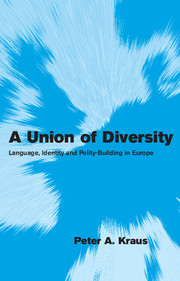Book contents
- Frontmatter
- Contents
- List of Tables and Figure
- Preface
- Acknowledgments
- A Union of Diversity
- 1 Introduction: The dynamics of European integration
- 2 The European Union's democratic deficit and the search for a European demos
- 3 The identity of a multinational polity
- 4 Language and politics: A challenge for Europe
- 5 The language question in the institutional complex of the European Union
- 6 Political communication in the transnational civil society
- 7 Recognition, self-determination and integration in a union of diversity
- References
- Index
- Titles in the series
3 - The identity of a multinational polity
Published online by Cambridge University Press: 22 September 2009
- Frontmatter
- Contents
- List of Tables and Figure
- Preface
- Acknowledgments
- A Union of Diversity
- 1 Introduction: The dynamics of European integration
- 2 The European Union's democratic deficit and the search for a European demos
- 3 The identity of a multinational polity
- 4 Language and politics: A challenge for Europe
- 5 The language question in the institutional complex of the European Union
- 6 Political communication in the transnational civil society
- 7 Recognition, self-determination and integration in a union of diversity
- References
- Index
- Titles in the series
Summary
European identity has become an all-pervasive concept. In the debate on integration it is used so frequently that to call its currency inflationary would be an understatement. Thus there is an evident risk of the concept turning into a catchall formula whose possible meanings vary arbitrarily from one context to another. Typically, those who tend to evoke it with emphatic intentions are also inclined to amalgamate what they take to be the ‘objective’ attributes of a European identity, as they may be derived from the realms of geography, history, culture and politics, with normative proposals for what should placed at the core of this identity, be it the canon of ‘occidental values’ or the idea of a ‘social’ Europe. All in all, adding the adjective ‘European’ to the identity concept does not seem to help very much in clarifying terms in a discursive field which is in any case permeated by all kinds of semantic ambiguities.
In this chapter, I do not intend to give a systematic inventory of the manifold ‘identity issues’ discussed so intensely in different social science disciplines over the last two to three decades. As is to be expected, the steady multiplication of scholarly uses of the category has already triggered the first massive counter-reactions. Brubaker and Cooper (2000: 2–3), for example, speak of an ‘“identity” crisis’ in the social sciences, a crisis they relate to the devaluation of meaning caused by overproduction.
- Type
- Chapter
- Information
- A Union of DiversityLanguage, Identity and Polity-Building in Europe, pp. 37 - 75Publisher: Cambridge University PressPrint publication year: 2008



